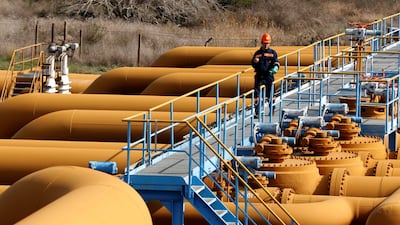Iraq and Syria on Tuesday discussed ways to boost bilateral energy co-operation, including the revival of the long-defunct Kirkuk-Baniyas oil pipeline that once transported Iraqi crude to Europe via Syria.
Syrian Energy Minister Mohammad Al Bashir and Iraqi Oil Minister Hayan Abdel Ghani agreed in their talks in Baghdad to form joint technical teams to assess whether to rehabilitate the decades-old line or build a new one, said a report from Syria’s state-run news agency, Sana, and a statement from the Iraqi Oil Ministry.
Mr Abdel Ghani said the “latest unrest in the region could affect Iraq’s oil exports, making alternative routes a priority”. He proposed hiring specialised firms to determine the feasibility of restoring the old pipeline or building a replacement.
Built in 1952, the pipeline ran about 850 kilometres from the oil-rich Kirkuk in northern Iraq to the Mediterranean port of Baniyas in Syria. At the time, its daily capacity was about 300,000 barrels per day.
Operations came to a halt after the outbreak of Iran-Iraq war in 1980 due to political disputes with the Syrian regime, a close ally of Tehran. The pipeline briefly reopened in 2000 to bypass UN economic sanctions on Iraq following its invasion of Kuwait in 1990.
The pipeline was heavily damaged during the 2003 US-led invasion of Iraq that toppled Saddam Hussein and has remained out of service since. Experts said it would need billions of dollars and stability in Iraq and Syria for it to be restored.
Mr Al Bashir said Syria currently imports about three million barrels of crude per month, in addition to its own output, to meet domestic demand, Sana reported. He stressed the “necessity of linking oil networks between Iraq and Syria to enhance economic co-operation”.

Reviving the Kirkuk-Baniyas pipeline would provide Baghdad with a new export outlet, instead of sending oil to international markets through the Strait of Hormuz in the Gulf, and provide Damascus with a source of badly needed fuel.
Another pipeline, linking Kirkuk to Turkey’s Ceyhan oil terminal, has been idle since 2023 because of a dispute between Baghdad and Ankara.
Iran threatened to close the Strait of Hormuz during its 12-day aerial war with Israel in June, jeopardising Iraq’s oil sales that provide more than 90 per cent of its federal budget.
Mr Al Bashir and Mr Abdel Ghani also discussed laying fibre-optic cables in parallel with the pipeline to boost regional connectivity with Lebanon, Sana said.
The establishment of ties began after Syrian rebels led by Hayat Tahrir Al Sham, a largely Sunni group formerly affiliated with Al Qaeda, toppled former president Bashar Al Assad in December. Shiite-majority Iraq has called for an inclusive political process in Syria, expressed concern over the danger posed by a resurgent ISIS, and demanded protection for religious and ethnic minorities and Shiite shrines.
In recent months, the two countries exchanged high-level delegations, reopened the main border crossing for travellers and goods, and increased co-operation in the fight against drugs.


